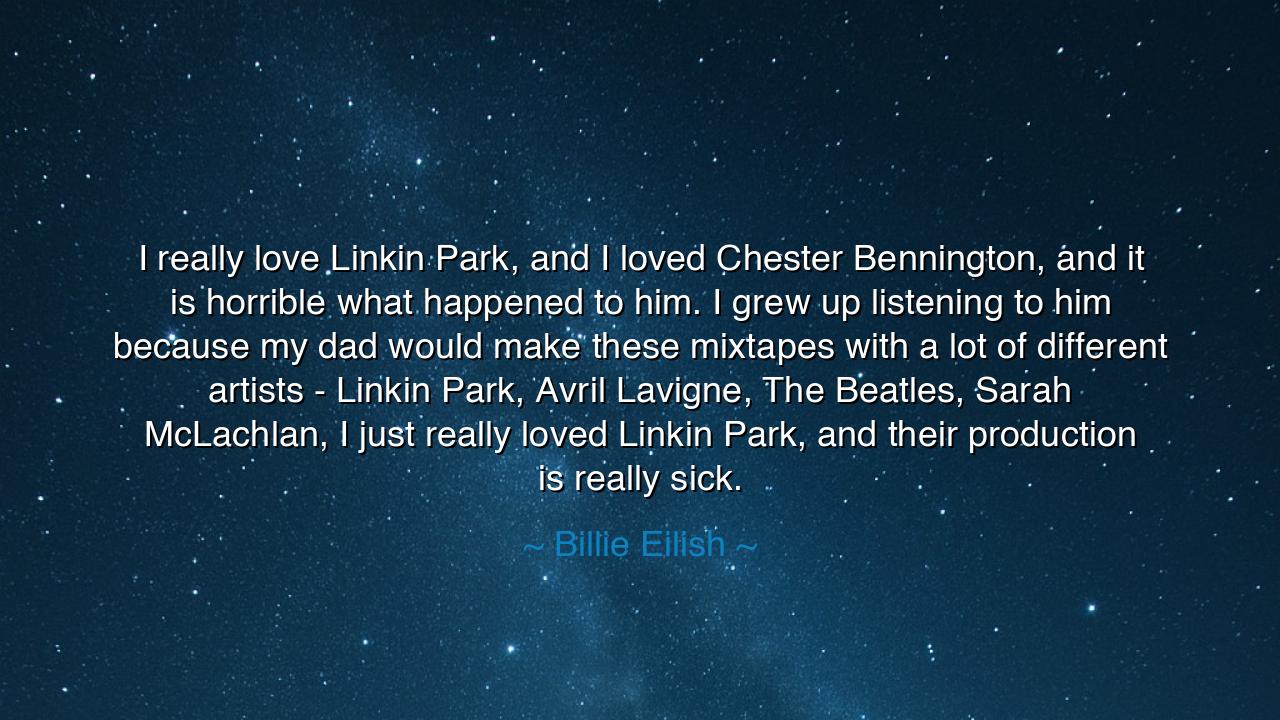
I really love Linkin Park, and I loved Chester Bennington, and it
I really love Linkin Park, and I loved Chester Bennington, and it is horrible what happened to him. I grew up listening to him because my dad would make these mixtapes with a lot of different artists - Linkin Park, Avril Lavigne, The Beatles, Sarah McLachlan, I just really loved Linkin Park, and their production is really sick.






In the words of Billie Eilish, “I really love Linkin Park, and I loved Chester Bennington, and it is horrible what happened to him. I grew up listening to him because my dad would make these mixtapes with a lot of different artists — Linkin Park, Avril Lavigne, The Beatles, Sarah McLachlan… I just really loved Linkin Park, and their production is really sick.” Beneath this simple remembrance lies a river of emotion — the mingling of grief, gratitude, and heritage. It is not merely the voice of a young artist honoring another; it is the echo of one generation passing the torch of music, emotion, and truth to the next. For in every song that shapes a soul, there is an inheritance more profound than wealth — the inheritance of feeling.
In ancient days, the poets sang of heroes whose voices could stir armies and calm storms. But in our time, the heroes of sound are those who bare their pain to the world, and in doing so, heal unseen hearts. Chester Bennington, with his cry torn between rage and sorrow, was one such modern bard. His voice carried the agony and beauty of the human condition — the eternal war between despair and hope. Through Linkin Park, millions found language for the storm within them. And when Billie speaks of him with such reverence, she is not only mourning a man, but honoring the bridge between generations — between the wounded past and the awakening present.
Billie’s father, too, stands quietly at the heart of her story — the maker of mixtapes, the keeper of sound’s sacred lineage. In those humble recordings, he wove a tapestry of voices — the rebellious cry of Avril Lavigne, the eternal melodies of The Beatles, the ethereal sorrow of Sarah McLachlan, and the electric catharsis of Linkin Park. Each song was a seed planted in young Billie’s heart, from which her own music would later grow. Thus, in her words we hear not only admiration, but the ancient truth that what we pass down shapes what is yet to come. The ancients called this anamnesis — the act of remembering that which forms the soul.
Let us recall the story of Orpheus, the musician of myth whose melodies could tame beasts and move the stones to weep. When he lost his beloved Eurydice, he descended into darkness, seeking her through song. Though he failed to bring her back, his music transformed the grief of humanity into art eternal. So too did Chester Bennington turn pain into power, shaping sorrow into songs that reached those standing at the edge of their own despair. His voice became a light for the lost — and though he himself fell to the shadows, his gift continues to echo through the hearts of those he saved. This, perhaps, is what Billie Eilish feels when she remembers him: that art is both wound and remedy, both farewell and rebirth.
In her words lies another lesson — that music is inheritance, a vessel that carries the soul of one generation into the next. We do not merely listen to songs; we inherit them. Every child who hears their parent’s music is touching the memory of who that parent was — their youth, their struggle, their longing. Thus, when Billie speaks of her father’s mixtapes, she is describing a sacred ritual as old as humanity: the passing down of feeling. Long before we had books, we had songs; and through songs, we remembered who we were. Music is memory carved in sound — it binds time and heart together.
But there is also sorrow in her words — a recognition of loss. “It is horrible what happened to him,” she says, with the quiet ache of one who knows that genius often walks close to despair. From this, we learn the eternal truth that even the brightest lights may burn themselves away. Let us not idolize the artist only for their brilliance, but care for them as human souls who give too much of their heart to heal others. Let us honor them not only in mourning, but in empathy — by extending to the living the compassion we often reserve for the lost.
The teaching, then, is clear: cherish the art that shapes you, but more so, cherish the humans behind the art. Pass down what you love, as Billie’s father did — share your songs, your stories, your memories. Teach your children not only how to live, but how to feel. In this way, you will plant roots that no silence can destroy. For even when voices fade, the love they carried remains, echoing in every note, every tear, every heartbeat that dares to feel.
Thus let it be remembered: music is not merely sound — it is the voice of our collective soul. To love an artist is to love a fragment of ourselves reflected in them. And when we honor those who came before — as Billie honors Chester — we keep alive the eternal truth that though the singer may fall silent, the song never dies.






AAdministratorAdministrator
Welcome, honored guests. Please leave a comment, we will respond soon